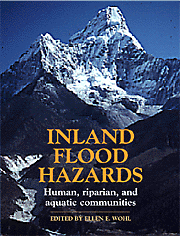Book contents
- Frontmatter
- Contents
- Preface
- Contributors
- INTRODUCTION
- PHYSICAL CONTROLS ON FLOODING
- FLOOD PROCESSES AND EFFECTS
- BIOLOGICAL FLOOD PROCESSES AND EFFECTS
- EFFECTS OF FLOODS ON HUMAN COMMUNITIES
- RESPONSES TO FLOODING
- FLOOD HAZARD MITIGATION STRATEGIES
- 14 Comparison of Flood Management Strategies
- 15 Nonstructural Mitigation of Flood Hazards
- 16 Planning for Flow Requirements to Sustain Stream Biota
- SOCIETAL CONTROLS ON HUMAN RESPONSES TO FLOOD HAZARDS
- CONCLUSIONS
- Index
15 - Nonstructural Mitigation of Flood Hazards
Published online by Cambridge University Press: 04 August 2010
- Frontmatter
- Contents
- Preface
- Contributors
- INTRODUCTION
- PHYSICAL CONTROLS ON FLOODING
- FLOOD PROCESSES AND EFFECTS
- BIOLOGICAL FLOOD PROCESSES AND EFFECTS
- EFFECTS OF FLOODS ON HUMAN COMMUNITIES
- RESPONSES TO FLOODING
- FLOOD HAZARD MITIGATION STRATEGIES
- 14 Comparison of Flood Management Strategies
- 15 Nonstructural Mitigation of Flood Hazards
- 16 Planning for Flow Requirements to Sustain Stream Biota
- SOCIETAL CONTROLS ON HUMAN RESPONSES TO FLOOD HAZARDS
- CONCLUSIONS
- Index
Summary
Introduction
Extent of Flood Vulnerability – Advantages of Floodplain Occupation
Rivers play a critical role in world history. They allow cities to develop. They serve as major transportation routes linking inland regions with the seas. River floodplains provide some of the most productive farmland. They serve as significant ecological systems and offer recreation opportunities.
Riverine floods are extremely expensive in terms of lost lives and lost property. However, floods also have benefits. They carry deposits of fertile alluvium. Floodplains have supported settlements along the Euphrates, Ganges, Indus, Nile, Tigris, and Yangtse Rivers for thousands of years (Alexander, 1993). Floodplain communities support river transport and support activities dependent on the river including fishing, barge traffic, and power-generating stations. They also have scenic value.
Goals for floodplain management can be conflicting. The flood loss reduction goal may contradict goals of real estate and industrial development or increased agricultural production. Floodplains are not always well managed. In the United States, although only about 7% of the country's total land area lies in floodplains, over 7 million structures and billions of dollars worth of community facilities and private property are vulnerable to floods (Owen, 1981).
In 1955, U.S. floodplains had 10 million occupants. Thirty years later the number doubled to 20 million, and by the mid-1990s about 12% of the national population lived in areas of periodic inundation.
Information
- Type
- Chapter
- Information
- Inland Flood HazardsHuman, Riparian, and Aquatic Communities, pp. 394 - 410Publisher: Cambridge University PressPrint publication year: 2000
Accessibility standard: Unknown
Why this information is here
This section outlines the accessibility features of this content - including support for screen readers, full keyboard navigation and high-contrast display options. This may not be relevant for you.Accessibility Information
- 7
- Cited by
